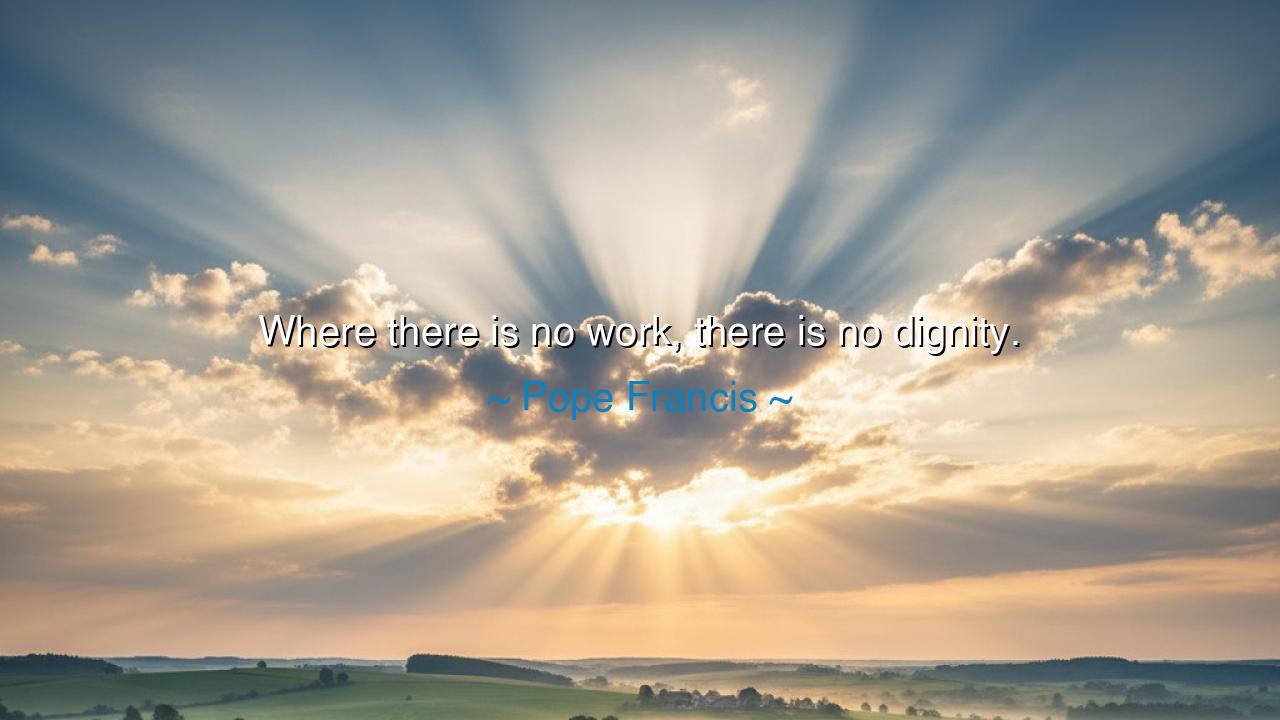
Where there is no work, there is no dignity.






In the life of humankind, the measure of the soul is revealed in the labor it undertakes. Pope Francis speaks with profound clarity when he declares, “Where there is no work, there is no dignity.” These words illuminate the sacred bond between effort and self-respect, teaching that to contribute one’s strength and skill is to honor both oneself and the world. The ancients understood this truth: a life of idleness diminishes the spirit, while honest labor elevates it, weaving the individual into the fabric of the community.
To engage in work is to participate in creation itself. It is through toil that humans shape the earth, sustain life, and fulfill their purpose. Pope Francis reminds us that work is not merely a means of survival, but a vessel through which dignity flows. One who labors with commitment and care carries the mark of worthiness, for the act of giving one’s abilities to the world is itself a testament to the value of the soul.
Where work is absent, dignity fades. Idleness, imposed or chosen, deprives the individual of the ability to contribute, to be recognized, and to claim a rightful place within society. The pope’s words echo the wisdom of civilizations past, where the honor of a craftsman, farmer, or scholar arose not from station alone, but from the integrity and persistence of their labor. In this light, dignity is inseparable from effort and purpose.
The origin of this wisdom lies in the moral and philosophical teachings of ages long past. From the philosophers of Greece to the sages of the East, humanity has long recognized that idleness weakens character while devoted labor strengthens it. Pope Francis, in modern voice, channels this timeless truth, reminding us that society flourishes only when all are empowered to engage in meaningful work, and that personal worth is measured by one’s contribution to the common good.
Thus, let this teaching endure: embrace work as a sacred duty and a source of honor. In every act of effort, from the simplest task to the grandest enterprise, lies the seed of dignity. To labor faithfully is to claim one’s place in the order of the world, to honor both oneself and one’s fellow beings, and to participate in the eternal rhythm of creation that sustains humanity across the generations.






TNKim Thi Nguyen
I agree with the notion that work can be empowering, but there’s also the question of what kind of work provides dignity. If someone is stuck in a job they hate or one that exploits them, does that still align with the idea of dignity? Is it the act of working, or the type of work, that brings dignity?
SNSjdnnd Nsjddb
This quote makes me think about how societies often value certain types of work over others. Does dignity depend on what job someone has, or is it more about the respect we show them regardless of their occupation? How can we create a society where people feel valued and dignified even if they don’t have a traditional job?
BABao An
I understand what Pope Francis is saying, but I wonder if the definition of 'work' is too narrow here. What about people who may not have a job but still contribute meaningfully to their communities, like caregivers or artists? Can dignity be found in forms of work that aren’t recognized by society in the traditional sense, like unpaid labor or creative pursuits?
KTLe Thị Khánh Thy
This statement challenges me to think about the deeper meaning of dignity. Is it tied to the kind of work we do, or just the act of contributing to society in any way? Can someone who doesn’t have a traditional job still find a sense of dignity in other forms of contribution, such as volunteer work or taking care of their family?
NTNhang Trieu
Pope Francis' quote really speaks to the importance of work in providing not only financial stability but also a sense of self-worth. But what if someone is unable to find work due to circumstances beyond their control? Does that mean they lose their dignity? How do we balance this idea with the reality that not everyone has equal access to job opportunities?